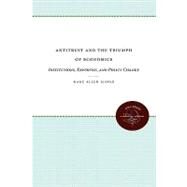Antitrust and the Triumph of Economics: Institutions, Expertise, and Policy Change
, by Eisner, Marc Allen- ISBN: 9780807865347 | 0807865346
- Cover: Paperback
- Copyright: 5/1/2010
Some of the chief aims of President Ronald Reagan's economic agenda were to reduce the "regulatory burden," minimize state intervention, and reinvigorate market mechanisms. Toward these ends, his administration limited antitrust enforcement to technical cases of price-fixing, invoking the doctrine of the Chicago school of economics. InAntitrust and the Triumph of Economics, Marc Eisner shows that the so-called "Reagan revolution" was but an extension of well-established trends. He examines organizational and procedural changes in the Antitrust Division of the Department of Jusice and the Federal Trade Commission that predated the 1980 election and forced the subsequent redefinition of policy. During their early years, the Antitrust Division and the FTC gave little attention to economic analysis. In the period following World War II, however, economic analysis assumed an increasingly important role in both agencies, and economists rose in status from being members of support staff to being pivotal decision makers who, in effect, shaped the policies for which elected officials were generally assumed to be responsible. In the 1960s and 1970s, critical shifts in prevailing economic theory within the academic community were transmitted into the agencies. This had a profound effect on how antitrust was conceptualized in the federal government. Thus, when Ronald Reagan became president in 1981, the antitrust agencies were already pursuing a conservative enforcement program. Eisner's study challenges dominant explanations of policy change through a focus on institutional evolution. It has important implications for current debates on the state, professionalization, and the delegation of authority. A UNC Press Enduring Edition -- UNC Press Enduring Editions use the latest in digital technology to make available again books from our distinguished backlist that were previously out of print. These editions are published unaltered from the original, and are presented in affordable paperback formats, bringing readers both historical and cultural value.







